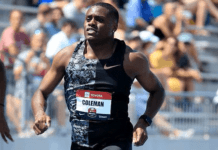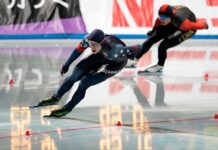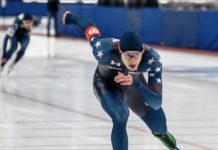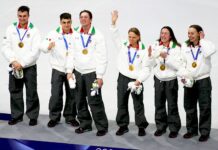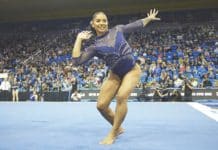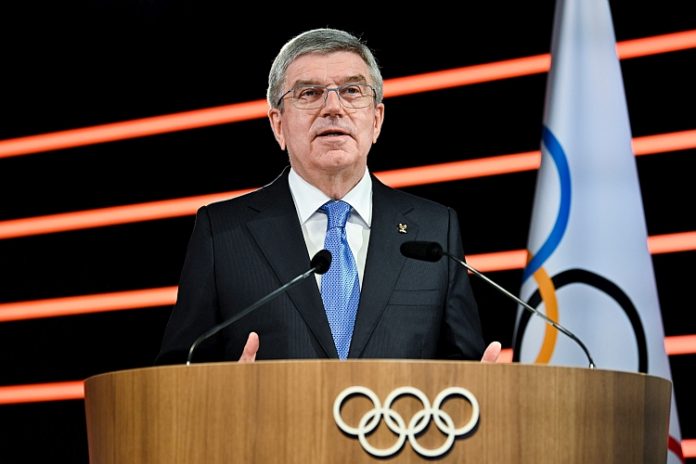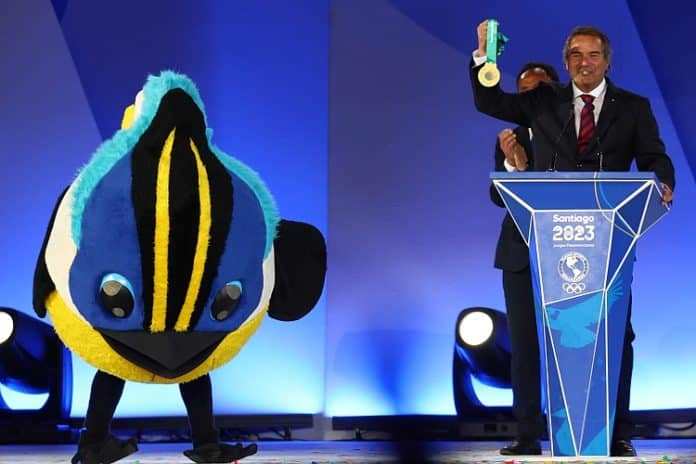★ The Sports Examiner: Chronicling the key competitive, economic and political forces shaping elite sport and the Olympic Movement.★
★ To get The Sports Examiner by e-mail: sign up here! ★
≡ THE 5-RING CIRCUS ≡
1. Bach: Paris 2024 is not being canceled due to the wars
2. Semenya case to be heard by European Court of Human Rights
3. Why squash for LA28? Excitement in a glass box.
4. U.S. leads track & field in top-10 performers in 2023
5. Athletics Fair Play Award finalists confirmed
● International Olympic Committee President Thomas Bach of Germany appeared at a German sports forum and said no thought has been given to canceling the Paris 2024 Games in view of the wars in Ukraine and Israel and Gaza. He also said that the people urging him to extend his term in office are the ones who have to make the needed rule changes.
● South African Olympic 800 m star Caster Semenya’s win at the European Court of Human Rights to force a more thorough review by the Swiss Federal Tribunal of her appeal from the Court of Arbitration for Sport will be reconsidered by a 17-member panel, after a request from Switzerland. The new hearing will not rule on the World Athletics regulations, but what standard the Swiss Federal Tribunal must bring.
● Why did squash finally make it into the Olympic Games, in Los Angeles for 2028. The chief executive of World Squash cited the sport’s organization, ease of set-up and the excitement of matches inside a glass cage!
● An analysis of the top-10 performers in each event in track & field in 2023 showed the U.S. with a very good year, fully reflecting its lead in the medal table at the World Championships. Most impressive: the Americans placed at least one athlete in the world top-10 for 2023 in 30 of the 44 individual events.
● World Athletic revealed its finalists for the annual Fair Play Award to be announced in December, with all three from either the 10,000 m or the Half Marathon!
● Podcast: TSX editor-in-chief Rich Perelman explored the status of the Olympic Movement and today’s challenges on the “Sports Business Podcast with Prof. C,” produced by the Fordham Gabelli School of Business, with Professor Mark Conrad. You can hear it here. ●
1.
Bach: Paris 2024 is not being canceled due to the wars
“We have a very strong geopolitical tension. To say that we are sacrificing the Games, that would be completely the wrong approach.”
That’s from an hour-long interview by International Olympic Committee President Thomas Bach (GER), appearing at the “Stuttgarter Sportgesprach” (“Stuttgart Sport Talk”) forum on Monday (6th), in which Bach was asked about a range of issues in play now and in the future.
On the conflicts in Ukraine and Israel and Gaza, Bach said that a cancellation of the 2024 Paris Games, a la the 1916, 1940 and 1944 events, is not being discussed (computer translation from the original German):
“We have had many wars between governments and countries, but the athletes have always taken part in the Games. This is in line with the Olympic mission.
“I don’t know that we’re having a world war. To betray the basic idea of sport is not something that can be done with the International Olympic Committee.
“According to the U.N. definition, we have 28 wars in the world at the moment. Our mission is a humanitarian mission for athletes and sport. We try to take that into account. People also need something that connects them.”
The situation with Russia and Ukraine continues to vex the IOC, and Bach noted, “Relations between the IOC and Russia have cooled down considerably since the doping scandal,” but on the question of admitting Russian and Belarusian athletes as neutrals for Paris, over the objection of the Ukrainian government and many others, he admitted, “It’s a dilemma.”
Bach reiterated the IOC’s stance on sport and politics, but with a slightly different twist: “Sport cannot and must not be apolitical, but it must be politically neutral. … If [sport] takes on the role of referee in every conflict, it will be the end of international sport.”
The question of Bach’s term as IOC President being extended beyond the term limit of 12 years in 2025 was explored, with Bach insisting that he was not behind this concept:
“It is typical that it is assumed that this was staged. That’s what I find unacceptable, that people judge it like that without knowledge.
“One argument is that a certain election campaign by some members [for 2025] has already started in Tokyo [in 2021]. That the majority of members found this disturbing. They don’t want all important decisions to be influenced by candidacies.
“Others say we live in such turbulent times that it is difficult to change teams now. You need a certain continuity here in order to survive. That is the basis on which we advise.”
And while not tipping his hand on whether he would accept to serve longer, he said again that it’s a people thing:
“I’m only human, I was happy about the response that came from different continents. If members make a suggestion to change the statutes, then they have to do it. Respect that you deal with these people.”
2.
Semenya case to be heard by European Court of Human Rights
An expected Swiss appeal against a close, 4-3 judgment of the European Court of Human Rights in July will send the case of Semenya vs. Switzerland for a hearing before a 17-member Grand Chamber of the European Court of Human Rights.
The case was the only one of 14 submissions accepted for a Grand Chamber hearing on Monday and none of the judges who participated in the original decision will be included.
The hearing, on a date to be determined, will not decide whether the World Athletics rules on participation by women with “differences in sex development” in elite competition will be upheld or repealed. Instead, the case was a last-chance attack by two-time Olympic women’s 800 m gold medalist Caster Semenya of South Africa on the review by the Swiss Federal Tribunal – on appeal from the Court of Arbitration for Sport – that she deemed inadequate.
The Court of Arbitration for Sport rejected Semenya’s challenge to the World Athletics DSD rules, and the Swiss Federal Tribunal did not overrule.
However, in the ECHR opinion issued on 11 July, the divided court ruled:
“The Court found in particular that the applicant had not been afforded sufficient institutional and procedural safeguards in Switzerland to allow her to have her complaints examined effectively, especially since her complaints concerned substantiated and credible claims of discrimination as a result of her increased testosterone level caused by differences of sex development (DSD).
“It followed, particularly with regard to the high personal stakes involved for the applicant – namely, participating in athletics competitions at international level, and therefore practising her profession – that Switzerland had overstepped the narrow margin of appreciation afforded to it in the present case, which concerned discrimination on grounds of sex and sexual characteristics requiring ‘very weighty reasons’ by way of justification.
“The high stakes of the case for the applicant and the narrow margin of appreciation afforded to the respondent State should have led to a thorough institutional and procedural review, but the applicant had not been able to obtain such a review.”
The Swiss Federal Tribunal has steadfastly maintained that it is not an all-purpose court of review of Court of Arbitration for Sport decision, but can only intervene due to specific errors or circumstances. Its request for a heating before the ECHR Grand Chamber is to enforce its limited review role and not make it an automatic last-resort venue.
If Semenya were to win before the Grand Chamber, the presumed remedy would be for the Swiss Federal Tribunal to implement a deeper review of the CAS decision on the World Athletics DSD regulations, and establish a precedent for the level of review required for all appeals from CAS.
World Athletics told Reuters, “World Athletics has only ever been interested in protecting the female category. If we don’t, then women and young girls will not choose sport.
“That is, and has always been, the federation’s sole motivation (for the regulations).”
3.
Why squash for LA28? Excitement in a glass box
Of the five added sports admitted for the Los Angeles 2028 Olympic Games, four were high-end team sports with significant collegiate or professional sports organizations behind then: baseball and softball, cricket, flag football and lacrosse.
So why squash?
The sport had been a candidate for inclusion at London 2012, Rio 2016, Tokyo 2020 and Paris 2024, but lost out each time. From the standpoint of low cost and complexity, favored attributes for the IOC these days, squash is attractive. Courts – glass boxes – can be built up in a couple of days and be plunked into a 5,000-seat arena with no difficulty.
The French-language site FrancsJeux.com posted an interview with World Squash chief executive William Louis-Marie (FRA), who explained some of the factors which worked in their favor this time:
“We tried to understand what they expected from a new sport, which is not yet at the Games, but has been present for a long time in the Olympic movement and in a large number of multi-sport events, such as the Commonwealth Games, the Asian Games and the Pan American Games. We showed our expertise and knowledge of these multi-sport events.
“We also insisted on our ability to bring the best players in the world, thanks to our collaboration with the professional association (PSA). The LA 2028 people came to see us at the last Commonwealth Games, last year in Birmingham. They saw the exceptional spectacle of two players competing in a glass cage for 30 minutes or an hour. Los Angeles is the capital of entertainment , the spectacle of squash corresponds well to their values.”
Although no 2028 venue has been specified, Louis-Marie explained the basic idea:
“We don’t have all the details yet, but we have ideas for an indoor theater, where squash could be beautifully showcased in a glass court, with an exceptional number of cameras.”
And he believes that with the showcase at LA28 ahead, the prospects for inclusion again at Brisbane in 2032 are good. In the short term:
“Athletes know today that they will have the opportunity to take their place on the most beautiful sporting platform in the world. It’s a great motivation.”
4.
U.S. leads track & field in top-10 performers in 2023
Now that the Pan American Games and the New York City Marathon have been completed, essentially all of the top performances of the 2023 outdoor track & field season are in the books.
While the medal standings of the World Athletics Championships are well known, let’s take a look at the breakdown by country of athletes ranked by mark in the top 10 (with ties) of the 44 individual Olympic events – track, field and walks – this year.
● Men (22 events):
1. United States, 39 top-10 performers
2. Kenya, 20
3. Ethiopia, 14
4. Jamaica, 13
5. France, 9
6. tie, Canada and Spain, 7
8. tie, Italy, Norway and Russia, 6
On the track, the U.S. led with 25 top-10 placers, followed by Kenya with 19, Ethiopia with 14, Jamaica (8) and France (7). In the field, the U.S. had 14 placers, with Italy a distant second with six, then Jamaica and Russia with five each.
The biggest domination of any event was in the marathon, where the Kenyans had eight of the top 10 this year. The U.S. men had top-10 performers in 13 events, with Jamaica totaling seven and Kenya, France, Spain and Canada with six each.
● Women (22 events):
1. United States, 48 top-10 performers
2. Ethiopia, 23
3. Jamaica, 15
4. Kenya, 14
5. China, 12 (nine in walks!)
6. tie, Great Britain and Netherlands, 10
8. tie, Australia, Germany and Russia, 5
On the track, the U.S. women scored 30 places, followed by Ethiopia with 23 and Kenya with 14. Jamaica had 11. On the infield, the American women took 18 places and no one else had more than five (Germany)!
Further, the U.S. scored in 17 different events; next was the Netherlands (9), then Jamaica (8).
The combined totals (44 events):
1. United States, 87
2. Ethiopia, 37
3. Kenya, 34
4. Jamaica, 28
5. China, 16
6. Great Britain, 15
7. Netherlands, 12
8. tie, France and Russia, 11
10. tie, Australia and Germany, 10
That’s a pretty amazing year for the U.S., which led the medal table at the Worlds in Budapest with 29 total medals, to 12 for Jamaica and 10 each for Great Britain and Kenya and nine for Ethiopia.
How about swimming? Coming up soon …
5.
Athletics Fair Play Award finalists confirmed
The finalists for the International Fair Play Award were announced on Tuesday, with all three related to world-championship competitions and all involving the long distances:
● Kenyan Daniel Ebenyo, who waved his support for teammate Sebastian Sawe as he was being passed at the World Road Running Championships Half Marathon. Sawe won in 59:10, with Ebenyo taking the silver in 59:14.
● Ethiopia’s Letsenbet Gidey, the women’s World Championships 10,000 m silver medalist, who went back to console Dutch star Sifan Hassan, who fell just before the finish. Gidey was in the middle of wat turned out to be an Ethiopian sweep (31:28.16), with Hassan appearing ready to overtake winner Gudaf Tsegay (31:27.18) in the final meters, but fell and finished 11th in 31:53.35.
● Jessica Warner-Judd (GBR), who finished eighth in the same women’s Worlds 10,000 m race in 31:35.38, then was the only one to wait for Brazil’s Maria Lucineida da Silva to finish, in 21st at 35:54.18, more than two and a half minutes after everyone else.
The winner will be announced as a part of the World Athletics Awards in 11 December.
¶
You can receive our exclusive TSX Report by e-mail by clicking here. You can also refer a friend by clicking here, and can donate here to keep this site going.
For our updated, 850-event International Sports Calendar (no. 4) for 2023 and beyond, by date and by sport, click here!











